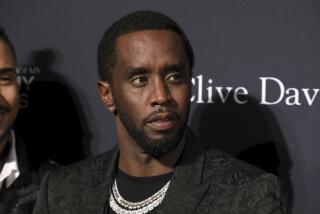JAZZ REVIEW : Happy Days Are Here Again With Max Bennett
Max Bennett delivers contemporary fusion-oriented jazz that has “sunny days” stamped all over it.
Fronting his five-man Maxx Band Saturday, the second of two nights at El Matador, the veteran bassist ran through a nine-tune first set that sparked the imagination and made one forget the recent blustery, arctic-like weather.
These weren’t tunes designed for a heavy, intense listening experience. Rather, the brief, innocent themes composed by Bennett--who has worked with Peggy Lee, Jazz at the Philharmonic and the L.A. Express--and their mostly easy and flowing rhythmic underpinnings recalled relaxing afternoons by the ocean or carefree drives up the coast.
Some had titles to match their moods. “Midnight Cruiser,” a dusky, insistent number with a sensuous bossa/rock beat that shifted to more swinging time, certainly sounded like motoring music. So did “The Long Road” and “Coastal Blues,” a slower piece with built-in repose. “Jack the Giant Killer”--an aggressive appellation--was by far the most energy-charged song in the set. The selections were played with snap, authority and taste.
The 63-year-old Bennett looked spiffy with his white hair cut short except for a ponytail, his wire-rimmed glasses and pink shirt and jeans. His younger partners were guitarist Brian Price, saxophonist Jeff Jorgenson, drummer Ray Brinker and guest keyboardist Rob Whitlock.
The opening “High Rollers,” featuring a Jorgenson solo on tenor that exhibited his resonant middle range, segued into “Midnight Cruiser” where Whitlock, consistently the evening’s most effective soloist, coaxed a modified electric piano sound from his synthesizer. He used that ringing sound to offer zesty ideas--lines zipped up, turned around and then descended; clusters seemed to spin in place--that he strung together into a well-constructed statement.
The subsequent “Brazilia” exemplified the cohesion of the rhythm section, which gave the various soloists a solid boost. The lyrical melody was rendered with passion by Jorgenson on soprano sax (though his tone was a tad whiny).
Whitlock then took the spotlight again, as Bennett, Brinker and Price created a warm tropical feeling that enhanced his sinuous playing. At one point, Price set up a groove with a series of chunk-a-chunking chords, as Bennett picked his notes precisely, fitting in with the guitarist’s pattern. Brinker then added pulsing fills, increasing the heat.
The leisurely ballad “I Need You Now,” with Jorgenson’s tenor again sounding as juicy as a ripe beefsteak tomato, found Price issuing thick, electrified tones that brought Eric Clapton’s style to mind, while Whitlock went for an ear-pleasing Hammond B-3 organ tone.
The medium-to-slow pace of the set was jarred nicely by the closing “Jack,” a gritty, up-tempo piece that added a dash of color (a few more tunes like “Jack” tossed in now and again would give Bennett’s show a little more spine).
“Jack” was lively and invigorating, despite Price’s use of feedback to get a wiry rock ‘n’ roll sound that didn’t fit in the band’s jazz context. On this selection, Bennett played his only solo, a concise affair highlighted by his delicate slapping technique, as he used his thumb and forefinger to issue two notes at once.
More to Read
The biggest entertainment stories
Get our big stories about Hollywood, film, television, music, arts, culture and more right in your inbox as soon as they publish.
You may occasionally receive promotional content from the Los Angeles Times.










